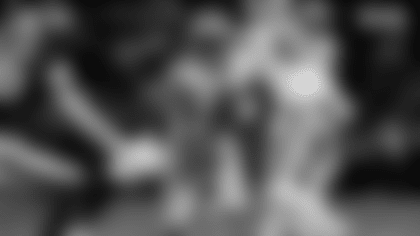Sterling Sharpe
In his accomplished seven-year career, Packers wide receiver Sterling Sharpe was known for a lot of things, but giving interviews wasn't necessarily one of them.
Yet, a few hours away from the ceremony in which he was to be inducted into the Packer Hall of Fame Saturday, Sharpe was generous enough to sit down with Packers.com to talk about everything from his playing career, to his golf game, to his relationship with the media.
Packers.com: Tonight you're being inducted into the Green Bay Packer Hall of Fame, what does this night mean to you?
Sharpe: "The weekend has given me a chance to go over my career. Because for me, when I stopped playing I had fulfilled my dream, so there was no, 'I could have played four years longer,' 'I could have played six years shorter,' because I had fulfilled my dream and I was extremely happy with that.
"Leading up to this week allowed me to go back over certain games and certain people and certain situations in our locker room and it gave me a chance to not be too prideful, but I was very proud of the player that I turned out to be.
"I never cared what people thought about me, I didn't have to be well-liked, I wasn't here to make friends, but I really cared and it really bothered me if someone thought, or said, or allowed their mind to slip for a moment to think that I wasn't a good player. That was important to me."
When you entered the NFL, did you ever dream that this day would come, could you have imagined this?
"No, never. I had one goal and that was to play. Everything else that happened to me, as they say on TV, was gravy. I never wished for, you can't ask for, you can't pray for anything else. You go out, you do what you're asked to do to the best of your ability. If you're honest with yourself, you say whether you like it or you don't.
"I enjoyed the seven years I had here. What was really great about being voted into the Packer Hall of Fame was that I came to Green Bay at a time no one wanted to come. I mean, I think they went down the coaching list a ways before they got to Lindy Infante (Packers coach from 1988-91). I was very proud of that, that I came here and was able to be successful as a player and help our team be successful in Green Bay, Wisconsin."
That said, you were a part of the Packers' rebirth in the early 90s, but because of your career-ending neck injury, you were not on the team when it ultimately broke through and won the Super Bowl in 1996, was that hard for you?
"No, not at all. Even having to work the game (for ESPN) was so fun because I knew so many of the personalities on the offense and defense still. But, no, I fulfilled my goal and my dream and I left nothing athletically in Green Bay.
"I've never looked back. Not once did I say, 'I wish I could . . .,' and I wouldn't. I did all I could do while I was here. I was not brought here to rebuild, I was brought here to be the best player that the Green Bay Packers thought I was and I tried to do that with the best of my ability.
"When they went to the Super Bowl, I'm not sure anyone in that locker room was happier than me because I knew so many of the guys and, with my brother (Shannon Sharpe) also playing in the National Football League, I knew what many of them had gone through to get there."
When you do look back on your memories in Green Bay, what comes to mind when you think about playing with Brett Favre?
"Playing with Brett and watching him grow from a guy not-knowing to a guy who understands what his role and his niche is, that in itself was ice cream and cake for me. The fact that he understood his talents and he grew to understand how to use his talents, that was enough for me.
"Then from what I have heard about some of the things that he went through off the field, that he was able to not only put that aside on Sundays, but was able to rise above it, now you're talking about something that's totally out of my league when you're talking about the character of this guy. I think he has proven that they were right about him and more importantly he has proven that he was right about him."
When you watch Brett Favre now, how has he changed since you played with him?
"He's a lot slower, and when I say that I don't mean speed-wise, I think he goes about things a lot slower and he enjoys things more. I think of the first few years he was in the league, they probably passed him by, because you talk about his gunslinger mentality, I don't think he understood what was being asked of him and I don't think he understood what the role and the job of the quarterback was.
"He understands it now because he's one of the older guys on the team and he's also showcasing his talents for the next guy, to show how that guy is going to have to play when he comes in here - I think a lot of people underestimate what that will mean.
"I think he has slowed down tremendously and I'm not sure how old he is, but when you slow it down to the point that he is, and that's just watching him on TV, life is a lot more enjoyable, football is a lot more enjoyable. Everybody has fun on Sundays, but that makes it fun when you're away from the game, that makes it fun when you come back, so I think he enjoys football right now probably a lot more than he ever has."
In your reminiscing going into this weekend, have you thought about specific games or specific plays that standout in your career?
"I've really thought more about the players. I think of my first touchdown catch from Randy Wright in Detroit, my last touchdown catch from Brett in Tampa, but there were a few guys in between. Mike Tomczak was a lot of fun to play with, of course playing with Brett and Don Majkowski. Having Ty Detmer and Mark Brunell on the team was psychotic, I thought, but they were a lot of fun to be around. I think of the offensive linemen and their personalities, Ken Ruettgers and Ron Hallstrom, probably the smartest two offensive linemen, and Tunch Ilkin and Billy Ard.
"Defensive-wise, the Brian Nobles the John Dorseys, the flamboyant character Tim Harris, Kenny Stills, Chuck Cecil, playing with Terrell Buckley and all the pressure he was under, playing with Tony Mandarich and all the pressure he was under. I never saw that. I never saw that amount of pressure, but it was unbearable just watching those guys go through what I guess was all that people expected of them. Darrell Thompson and Tony Bennett and those guys, I was like, wow, those guys were under a lot of pressure to perform.
"This week, going back over that, I just think that I don't know how those guys survived that. Terrell is having an outstanding career, Tony Bennett went to Indy and really did some very nice things there, but it was like, wow, that's a lot of pressure for a young man to go through. Those are the things I've thought about."
Speaking of pressure, after your NFL career you made the switch to ESPN, how hard was that transition?
"It was very easy because that wasn't my goal. My dream was to play in the National Football League, nothing else, so when that was over, I was, I'm not sure what the word is - I was happy, I was relieved that I could accomplish a dream that I'd had since I could remember.
"So after that, I had to ask myself, after all this, what have you learned that's going to keep you from sitting around at the house all day. And it was pretty amazing because job opportunities started coming at me left and right, and it just so happened that the one at ESPN worked out for me.
"It's been the best for me because I still love football, I was taught by two outstanding offensive minds in Lindy Infante and Mike Holmgren, I was able to be coached by some outstanding minds as far as John Gruden and Sherm Lewis go and those guys, Buddy Geis, and defensively, being around Hank Bullough, being around Fritz Shurmur, being around Ray Rhodes.
"It worked out to be a pretty good fit for me, but I'd never thought about doing TV. In fact, when I left the audition with ESPN I didn't think that I'd gotten the job, so I was pleasantly surprised. I tell this to people all the time, having done what I wanted to do, everything else is just summer school. I've already done what I wanted to, I played football at the highest level, I can't ask for anything more."
Is it a hard position to go into, to offer opinions on other teams or other players, sometimes having to talk about guys you know and played with?
"No, because I only have a job because 98 percent of the fans who watch or go to the games can't call a Mike Holmgren or a Mike Sherman. I have the ability to call these guys, because I don't know what's going on in Green Bay, I don't live here anymore.
"So in order for me to do my job I have to be able to call these coaches and get a feel for what training camp is going to be like, how do you want to come out of training camp, what do you hope to accomplish. I can just relay what you're team is hoping, thinking and saying that you might not get from Mike Sherman himself."
So the ESPN job keeps you from sitting around at the house all day, what is your average day like now?
"I have great people in great positions in terms of managers, so my average day now is that I get up and if my little girl has school I try to every now and then take her to school - this is during the football season - and I leave for ESPN on Saturday mornings, I fly back on Tuesday mornings, and when I'm not prepping for my job at ESPN I'm on the golf course trying to get my golf swing back."
Is golf a recent hobby, or something you've always been interested in?
"I've been playing 4-and-1/2 years and I am extremely addicted to it."
What's your handicap?
"I am probably, I don't know what the USGA says, but I think my handicap is somewhere around 2."
Is golf a competitive release for you?
"No, I just started playing golf with my father-in-law and I enjoyed it so much, and for me to be invited to tournaments I didn't want to be the worst golfer out there, so I worked hard at it. But what I really love about it is that everything that I did for football in the summer or during practice helped me in the game of football, but golf is the total opposite.
"Because I never thought about running an in-route or running a slant-route, I never thought about it. It got to the point where everything that happened in football was reaction, but everything that happens in golf is action.
"It is the toughest thing to control because one day you can go out and shoot horribly on the range and shoot 69 and the next day you can hit great on the range and shoot 83. There's a very thin line between those two numbers, although there's a lot of numbers in between them.
"It is a lot of fun and I've met so many people. What's really funny about playing golf is I've met so many people who didn't know me. I had a guy, my partner in a pro-am tournament, tell me after a few holes, 'It's a pleasure meeting you, I've heard a lot about you.' I said, 'It's all true.' He goes, 'Well, I heard you were (a jerk).' And I said, 'Well, that's probably true to a lot of people and the situations we've been in together.'
"So I've gotten a chance to meet some outstanding people and learn so much about life away from athletics that has been extremely helpful to me in my pursuit to help young people achieve every dream that they've ever had. It's funny that the same high that I got from playing in the National Football League, some guy gets from working at a bank, or some guy gets from being a tennis coach, or some guy gets from being the groundskeeper at a golf course.
"I've learned that whatever dream you have, let me tell you, there's nothing like doing what you want to do. Whether it's painting, gardening, running the camera or being a reporter, if that's what you want to do, there's nothing on this earth like it, nothing better."
What are your favorite golf courses that you've played?
"I like them all and I've played everywhere from Augusta to Pebble Beach, to La Costa, to Torrey Pines. I've played a lot of them and they're all great."
So what would you do if you had one round left?
"If I had one round left I'd probably like to go play Bethpage Black, because I haven't and based on the way it beat up the pros (at the U.S. Open), I'd like to take my beating. That's one of those losses that you're really proud of, to be able to say, I shot the best 86 that I could shoot.
How often do you get back to Green Bay?
"I probably get back here once or twice a summer, but for my job I used to come back more, but with the way it's set up now, we have so many guys in the field that you don't get to come back. It's funny, I think my first trip back here was to do an interview with Brett Favre and my friend Jeff Blumb (of the media relations staff) said, how funny is that, you're coming back for an interview and you never did interviews.
"And you know what I have found out, Randy Moss won't sit down with me for an interview, but he's still a hell of a player and I enjoy watching him play regardless of what he says as far as playing when he wants to play. I have a job to do and I don't need players to do my job. A lot of players are wary of me because I have the job at ESPN. Even in golf settings, they'll say, 'I need to be careful what I say,' and I think, I've been there.
"It's a learning experience finding out what other players think of you doing what you do. Most of them like what I do and how I do it, but that's another way golf has been an extremely wonderful educator for me."
Has your opinion changed at all regarding your relationship with the media during your career now that you're working at ESPN and have maybe seen things from the other side?
"No, because it's not that I didn't like them, I liked all those guys. But it's not like I really had a chance to admire their work because if you read the newspaper as a player you are going to get what you ask for. There's not any of them that I didn't like.
"And it's funny, there's a lot of people who have opinions about me who have never heard me speak. There are a lot of people who thought I didn't like being in Green Bay, that I didn't like any of my teammates, which are both totally false. But I have laughed at the fact that more people have an opinion about me with me not saying a word than they would have if I had talked to everybody. So I wonder how that happened, maybe you could do a background check and let me know."
Getting back to your playing career, what are your memories of playing at Lambeau Field?
"Well, I'm 'Old School' and to me, Lambeau Field is 'Old School.' You play when you're hurt, you play in the cold, play in the mud, you play when the field conditions are nowhere near their best and you go out there and you perform because you're a professional. Every time I think of Lambeau Field, that's football to me.
"I played in the stadium in Miami that's very bright, I've played in some of those domes that are very bright, but they're not football. I'm seeing a bunch of new stadiums go up, but they're not football. Football to me is getting a chance to put the best competition in the best setting and you give it your all. And when you walk off the field, knowing you better than anyone, you should be saying, I did all I could today. I got that from Lambeau Field."
How much are the Packers fans a part of that Lambeau Field experience?
"Well, one of the other things I like about Lambeau Field is that the fans are on top of you. I can remember when I first got here they were on top of you and they weren't saying many things that were pleasant to the home team, but as we got the thing headed in the right direction they were extremely complimentary. I like all of that. I don't know what it's like to be a visitor coming into Lambeau Field, but I know what it's like to be the home team and it's a pretty awesome experience.
"And I thought the Packers fans were extremely knowledgeable, for all the people who thought they were a bunch of farming, gun-toting, hunting hicks, I thought they were extremely knowledgeable. And do you know what, if you were their favorite, you were their favorite. They didn't care what you did off the field.
"The fans in Green Bay are 'Old School,' if they like you, they like you. If it just so happens that it doesn't work out for you here, I remember when Tim Harris went to San Francisco, they liked him just as much here. I think these fans, if you're their guy, you're their guy, through thick and thin, hell and high water, you are their guy.
"That's pretty refreshing nowadays with everyone who wanted to be like Mike and now they want to be like Kobe and Shaq and Allen and everyone else. Green Bay fans, they're pretty exciting."
How as the game changed since you retired?
"I think there's a lot more selling of one's self. You can look and I played with a lot of emotion, I thought, but I make a 4-yard catch for a first down, I think everyone knows it's a first down. I don't have to get up and show that.
"Some of the end zone celebrations, I'm sorry, but I was doing my job and I was so thankful to be able to get in the end zone and I was usually too tired to celebrate. But when you look at today's players, some of them, that's what they do and that's who they are.
"And if that's who you are, then be that all the time. I'm a big stickler on consistency. If you celebrate during the good, I think you should be made to celebrate on the bad. If you celebrate on a touchdown catch, you need to celebrate on a drop. If you celebrate on a big hit, you need to celebrate on a missed tackle. But you don't get that in sports, I think it's self-promotion. Everyone, instead of making the money that the team is paying them, is trying to make money everywhere else."
You mentioned earlier that you never cared what people thought about you, but when you think about the Packers fans, how would you like to be remembered?
"Wow, now you're talking about what the fans think and that's tough. I can't really answer that, but here's what I can tell you about being here right now. Being in the Green Bay Packer Hall of Fame, whatever the criteria is to get in, they didn't care how I was off the field, they didn't care how I was when I went home, they didn't care how I was with the media, the only thing, if I'm not mistaken, is that I got into the Green Bay Packer Hall of Fame by being the type player that I was.
"That's the only concern I had when I left the game. In a brief moment I had to make sure that I was the type of player that when I came into this league I wanted to be, that Tom Braatz and Lindy Infante making me the No. 1 draft pick wanted me to be, and that anyone that decided I was their favorite player wanted me to be.
"Now when you talk fans and how I want to be remembered, that's a big stretch for me to even begin to answer because I don't know. Do you want to be remembered based on what someone else thought? Whatever the criteria is, I think the people that are responsible for putting me into the Green Bay Packer Hall of Fame had to see me play at least a few times and I must have done something as a player.
"But that's a tough, tough question to ask and a tough question to answer. I honestly couldn't tell you how I wanted, if I wanted, to be remembered, because when you have one dream, your dream is to play. It's not to play really well and to go to the Pro Bowl, and to play in a Super Bowl, and to win a Super Bowl and retire in 10 years.
"You have one goal and one dream and that's to play in the National Football League and if you can accomplish any or all of that other stuff, then God can take you right now because you have had your heaven right here on earth."














